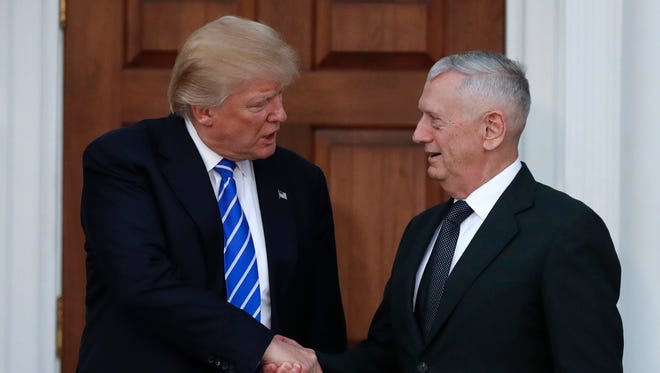Trump and his Cabinet nominees: Here's where they disagree

Senate confirmation hearings for Donald Trump's Cabinet nominees are exposing several political differences.
Namely, differences between Trump and his nominees.
Defense Secretary-designate James Mattis, Secretary of State nominee Rex Tillerson, CIA Director-in-waiting Mike Pompeo and Homeland Security pick John Kelly have taken different positions from Trump on such issues as trade, border security, foreign policy, Iran, and — perhaps most frequently — Russia.
"Russia is raising grave concerns on several fronts," Mattis said during his Senate confirmation hearing Thursday, departing from Trumpian positions on items like a U.S. military presence in the Baltics to deter the Russians and its posture toward NATO.
Mattis also said the United States should maintain the Iran nuclear deal, though Trump has vowed to nullify it and reimpose sanctions on the Tehran government.
The retired Marine general has disputed Trump before. During a meeting last year, Mattis said he disagreed with Trump's support of the interrogation technique known as "waterboarding"; Trump said the general's argument changed his thinking on the subject.
Trump and aides downplay the differences, saying they will encourage robust debate within the administration.
"All of my Cabinet nominee are looking good and doing a great job," Trump tweeted Friday. "I want them to be themselves and express their own thoughts, not mine!"
In another confirmation hearing, State Department nominee Tillerson was more critical than Trump over Russia's aggression toward Ukraine. He was more forceful in agreeing with the intelligence community's assessment that Russia was behind the hackings of Democratic officials during last year's election.
The ExxonMobil CEO also said he supports free-trade agreements criticized by Trump and that the United States should stay involved in international talks on climate change, despite the president-elect's criticism of the current global climate change agreement.
Tillerson also said that aides will debate issues during the administration, but "the president will decide."
Many of the differences are of degrees.
Tillerson, for example, said sanctions on Russia should stay in place, though Trump has only hinted at revisiting them. He also expressed disapproval of a Muslim registry, as suggested by Trump and aides, but they have not yet made a specific proposal on that idea.
The CIA nominee, Pompeo, said he would "absolutely not” authorize waterboarding of terrorism suspects, though Trump has indicated he has backed off his earlier support. Pompeo also seemed to dispute Trump's criticism of the intelligence community over the investigation of Russia.
Homeland Security secretary-designate John Kelly disputed Trump over another high-profile issue: a proposed wall along the U.S.-Mexico border.
Kelly said that, in order to block illegal immigration, a wall needs to be accompanied by other security measures like aerial surveillance. He told senators that "a physical barrier in and of itself" would "not do the job."
These kinds of differences are all part of the process, Trump aides said.
Trump transition spokesman Sean Spicer said presidents almost never have 100% agreement with nominees, and Trump wants to encourage a difference of views among his advisers.
At the end of the day, Spicer said, "each one of them is going to pursue a Trump agenda and a Trump vision."
Read more:
Tillerson says Russia poses a 'danger,' but defeating ISIL is a priority
Building a wall not enough to secure border, DHS nominee John Kelly says
Mike Pompeo, Trump's choice for CIA director, lists Russia as threat
Mattis says Putin 'trying to break' NATO
